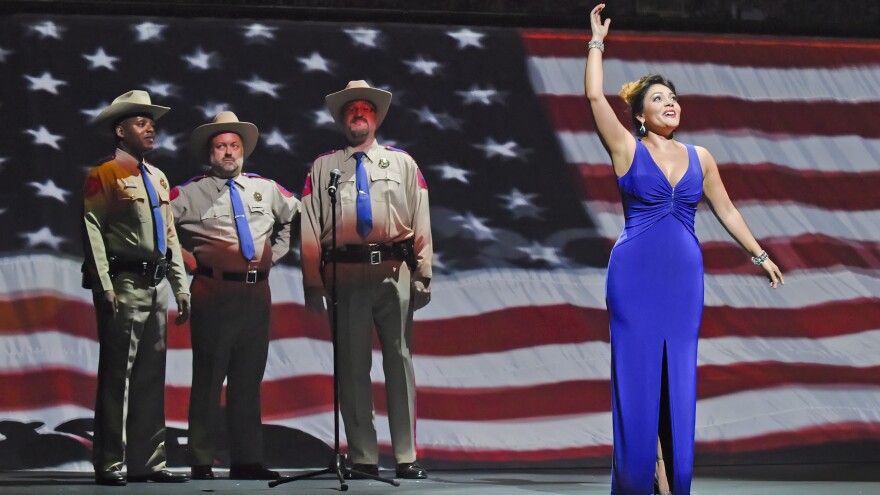You don't often hear "football" and "bel canto" in the same sentence. How about the same opera?
The new production Great Scott, which premiered Friday at the Dallas Opera, pulls that off with a meta-story of sorts: It's an opera about a struggling opera company, whose future just happens to hinge on the outcome of the Super Bowl. If that sounds complicated, fear not — the show's star, Joyce DiDonato, says there's a simpler idea at its heart.
"I think the best way to describe it is that it's a generous, melodic love letter to the world of opera and art, and it's mashing together a lot of different worlds," she says. "We have the world of a local football team, The Grizzlies, that's going to the Super Bowl for the first time. And we have this American diva coming home for the first time in a long time."
DiDonato, a real-life opera star, plays that diva herself. She joined NPR's Scott Simon to talk about working with composer Jake Heggie and playwright Terrence McNally, and how the show marries the classic and the modern. Hear their conversation at the audio link, and read an edited version below.
Scott Simon: The plot of Great Scott feels like it could be a real story. Y
ou have an acclaimed opera singer who returns to her hometown, feels some distance from it, wants to do something great for the place. And while her hometown football team is heading to the Super Bowl, the hometown opera where she got her start is in trouble.
Joyce DiDonato:Absolutely. It's truly a story for today, because it poses the question to all of us who love the arts and who are a contributing part of society saying, "In the end, does this actually matter?" It takes a lot of sacrifice, a lot of money, a lot of time. For the artists on stage, it's a lot of heartbreak and a lot of sacrifice in their personal lives. And this woman — her name is Arden Scott — this diva, she's asking herself, "Has it been worth it? Here I am, mid-career; I'm at the top of my game, at the summit. Am I making a difference?"
There's a very beautiful moment of music I want to point out, where Arden Scott is rehearsing her role in the bel canto she's going to perform.
What I love that Jake has done in this piece is, he's paying such wonderful homage to the Italian bel canto period that opera lovers love, and then he really seamlessly weaves it into music of today. We go in and out of these different genres and we realize there's not a lot of separation between them, that we're dealing with music that is telling a story and giving emotion to these characters.
What is it like to perform a new work? My question might be totally ill-premised, as they say, but I'm going to suppose that a lot of opera singers sing works that they've grown up hearing or have learned about by the time they do it professionally. But here, you have a brand new work.

As an opera singer, in a way, we're in competition with the ghosts of the past. It's almost impossible for opera lovers to come to the theater and not hear Maria Callas or Beverly Sills or Leontyne Price in the back of their heads if we do the traditional repertoire.
When we're doing a new piece — and in particular, this piece that's based on a completely original story, not based on any literary source — the audience is coming for a completely new sonic, theatrical experience and they have to listen with very fresh ears. I'm not tied to expectations of, "Oh, Callas held this note a bit longer, but maybe I can't do that." I'm given incredible freedom through the score to really bring it to life.
Now, most of the libretto of this opera is in English. The music has what we'll refer to as references — quotations, if you please — that might echo music from various popular traditions. You're known, among opera stars, for being accessible to the outside world. And I wonder if you think this world is kind of a path for opera.
Oh, I don't think there's any singular piece that is a greater advocate for why opera exists. Everybody in the world of arts is represented in this piece. You have the donor. There's a stage manager, who's sort of one of the anonymous, behind-the-scenes, nobody really knows his last name kind of characters — who, without them, we don't get onto center stage with the spotlight. There's the conductor. There's the composer of a hundred years ago. Everybody's really sort of given a voice in this piece.
I think it's going to really show the world how much enthusiasm and relevance there is to what we're doing. In Arden's life, she's questioning the sacrifices she's had to make. And in the Italian opera that we're presenting on this opening night — the same night as the Super Bowl — the lead character, Rosa Dolorosa, has to jump into a volcano to spare all of the people of Pompeii. Which, as we know, didn't actually turn out very well.
Not for her or Pompeii.
[ Laughs] No, no — but she at least went ahead and did it anyway. So, we're walking this parallel line about sacrificing and being a part of something greater than yourself.
I think it's the perfect moment in the world, but also in American culture, to remind ourselves that the classics and the great arts really have something to teach us. They're far less old-fashioned than we think they are. If we look at them and give them a modicum of credit, we have a lot to still learn about ourselves through these masterpieces.
Copyright 2020 NPR. To see more, visit https://www.npr.org. 9(MDAwMTM1NDgzMDEyMzg2MDcwMzJjODJiYQ004))



